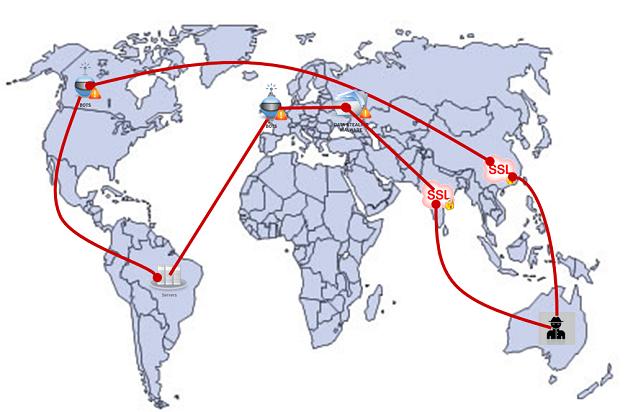'Small fish' evade us: Trend Micro

In a world where law enforcement is governed across different jurisdictions, criminals are exploiting the borderless properties of the internet to conduct online crimes and get away without even being challenged, according to Trend Micro senior architect of anti-spam and URL filtering Jonathan Oliver.

Botnets can reside in multiple different jurisdictions, separate to the command-and-control centres and the hacker's home country.
(Credit: Trend Micro)
Oliver said that law-enforcement agencies are limited by what they can do in response to cybercrime, and often have to let the small fish go in order to make the best use of their resources.
"They use the laws that they've got at hand to try and collect the evidence and prosecute the worst offenders. I think they're overwhelmed by a lot of small cases, and don't have the bandwidth, so they just don't even attempt," he said.
"A small phishing scam? They're just not going to chase it up. They know that it's far too difficult, and nothing will be achieved."
But medium-sized crimes are also being overlooked; they are becoming too difficult to pursue, as criminals realise that they can exploit the fact that law enforcement must respect geographical boundaries.
"Cybercriminals make sure that they jump jurisdiction a few times. For example, the command-control servers in one jurisdiction have their botnets in another jurisdiction, and commit a crime in the third. This makes it very difficult to actually put together a case and prosecute them. And so, in the vast majority of cases, nobody bothers. It's not worth the effort. This enables them to continually do this high-volume constant criminal activity."
Even if law-enforcement agencies do attempt to crack down on these sorts of crimes, Oliver said that they are often highly complex, and beyond the scope of understanding for those involved.
"You try and explain the crime and the sequence of events and the judges and the prosecutors just don't have the training. It's a large task bringing everyone up to speed. That's a significant problem for the Australian Federal Police. When they want to prosecute and try these cases, judges, juries and prosecutors may not understand. That introduces another legal hurdle."
Oliver said that Australia needs more cooperation and treaties with other countries to ensure that criminals can be effectively prosecuted, but that progress is falling behind. While he applauded the fact that the issue has been brought up and discussed at previous Commonwealth Heads of Government Meetings, he said that we definitely need change.
"That's the type of initiative that we need to see, and then grow from there."